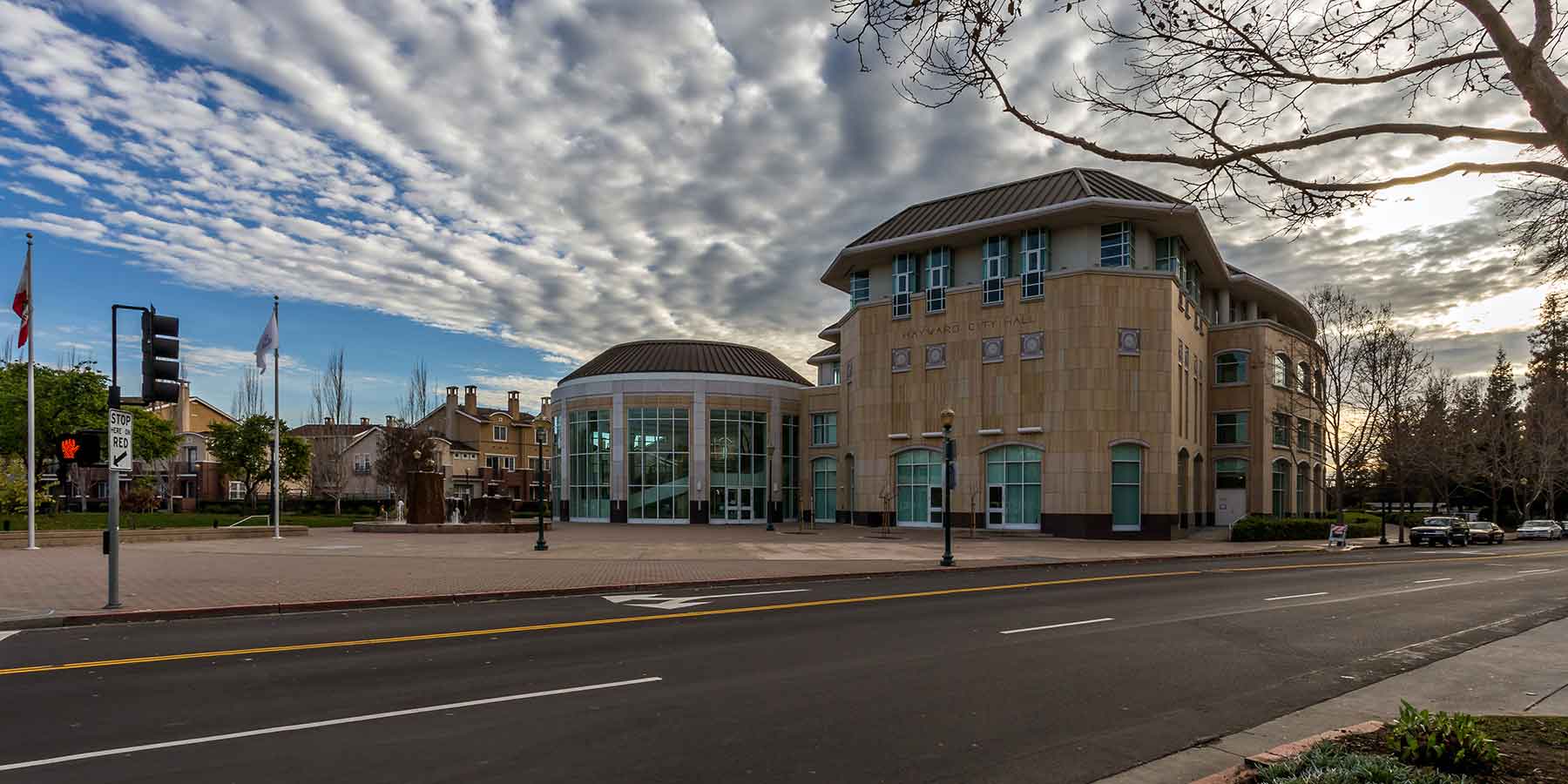Landlord Rental Resources
The information on this page is specific to the perspective of a landlord and outlines the general responsibilities and requirements for a landlord as it relates to rent increases, rent view process, and petitions that are included in the Residential Rent Stabilization Ordinance (RRSO).

If you need further assistance, please contact our staff at the Rent Review Office. Staff is available to assist by e-mail, housing@hayward-ca.gov or phone at (510) 583-4454. Para español llamar (510) 583-4246.
Resources and information:
ENGLISH:
Compliance Documents:
- RRSO Summary
- Notice to Tenants of the RRSO
- Public Notice for Covered Units
- Rent Increase Notice
- Rent Review Fee Pass-Through Form (for covered rental units)
Petition Documents:
- Tenant Petition Form
- Tenant Petition Process Infographic
- Landlord Petition Form
- Landlord Petition for Capital Improvement: Schedule A
Fact Sheets:
- Just Cause Fact Sheet
- Section 8 Fact Sheet
- Tenant Protection Fact Sheet
- Mediation and Arbitration (Rent Review) Fact Sheet
Other Resources:
SPANISH:
Documentos de cumplimiento (Compliance Documents):
- Resumen del RRSO (RRSO Summary)
- Aviso para los iquilinos sobre el RRSO (Notice to Tenants of the RRSO)
- Aviso público del RRSO (Public Notice for Covered Units)
- Aviso de aumento de alquiler (Increase Notice)
Documentos de petición (Petition Documents):
- Petición del inquilino para la revisión del alquiler (Tenant Petition Form)
- Petición del propietario (Compensación justa o fondos transferibles de los costos del mejoramiento de capital) (Landlord Petition Form)
- Proceso de petición del inquilino: gráfico (Tenant Petition Process Infographic)
- PETICIÓN DEL PROPIETARIO - CALENDARIO A: Fondos transferibles para el mejoramiento de capital (Landlord Petition for Capital Improvement: Schedule A)
Hojas informativas (Fact Sheets):
- Causa justa para el desalojo: Ficha informativa (Just Cause Fact Sheet)
- Prohibición de discriminación relacionada con fuentes de ingreso: Ficha informativa (Section 8 Fact Sheet)
- Protección contra acoso y represalias al inquilino: Ficha informativa (Tenant Protection Fact Sheet)
- Proceso de resolución de disputas de alquiler (revisión de alquiler): Ficha informativa (Mediation and Arbitration Fact Sheet)
CHINESE:
合規文件 (Compliance Documents):
- RRSO摘要 (RRSO Summary)
- 致RRSO租戶的通知 (Notice to Tenants of the RRSO)
- 涵蓋單位的公告 (Public Notice for Covered Units)
- 租金上漲通知 (Rent Increase Notice)
請願文件 (Petition Documents):
- 租戶租金審查申請書 (Tenant Petition Form)
- 房東申請書 (合理投資回報或固定資產改善成本轉嫁)(Landlord Petition Form)
- 租戶請願過程:圖形 (Tenant Petition Process Infographic)
- 房東申請 - 附表 A: 固定資產改善費用轉嫁 (Landlord Petition for Capital Improvement: Schedule-A)
情況說明書 (Fact Sheets):
Invoices for annual fees for fiscal year 2025 were sent to all property owners on September 16, 2024. Fees are due October 16, 2024.
Click here for a list of questions and answers to frequently asked Rent Review Fee questions (updated October 27, 2023).
As the landlord, you must provide the City a copy of the following notices:
- Rent increase notices; and
- Notices of termination of tenancy.
This applies to all rental units. The notices must be provided to the City within 30 days of giving the notice to the tenant. If you do not provide the City with a copy of the notices, the City can issue a citation for each violation.
Rent Increase Notices and Notices of Termination of Tenancy can be provided to the City by mail, in person or via email:
777 B Street, Second Floor, Hayward, CA 94541; telephone:(510) 583-4454; RentalNotifications@hayward-ca.gov.
As a landlord, you are required to comply with the noticing requirements outlined in the Residential Rent Stabilization Ordinance (RRSO):
RRSO Notice:
As a landlord, you must provide each tenant with a copy of the RRSO or the City of Hayward RRSO Summary. The landlord shall provide a notice that identifies which sections of the ordinance apply to the unit. Tenants must be given this information within 30 days after the effective date of the RRSO and before renting a unit. Forms are available below.
Rent Increase Notice:
For a rent increase notice for a covered unit, the landlord must explain the rent increase and give the tenant with information about rent review.
The following information is required on a rent increase notice:
- The amount of the current rent;
- The rent increase in both dollars and as a percentage of existing rent;
- A statement explaining the rent increase;
- Documentation supporting the rent increase;
- Contact information for the City’s Rent Review Office;
- A copy of the City’s petition for rent review form; and
- Contact information and availability of the landlord or landlord’s representative to discuss the rent increase.
As the landlord, if you do not properly notice a tenant, a tenant can challenge an eviction or a rent increase. A sample form is available below.
Utility Cost Notice:
If requested by the tenant, the you must provide the tenant with information that explains the increase in utility costs. This information includes:
- Proof of the utility costs for the entire building during the previous 12 months;
- Costs by month or billing period for each unit;
- Notices from the utility provider about the rate increase; and
- Calculation used to calculate costs of each unit (Ratio Utility Billing System [RUBS] or similar unmetered allocation arrangement).
Forms:
English
Spanish
- Notice to Tenants (RRSO) in Spanish
- Public Notice for Covered Units in Spanish
- Rent Increase Notice in Spanish
Chinese
Response to Tenant Petition:
After the tenant files a petition, the City will provide the landlord a copy. Mediation will be set within 30 days after a petition is accepted. Mediation can be waived if both landlord and tenant can agree. Landlord has until 5 days before the scheduled mediation to provide documents in response to the petition. Please use this response form.
View the steps of the rent review process for tenants for more information on expectations for tenants during the rent review process.
Landlord Petition:
A landlord can request rent review to determine allowable rent increase above 5% for the following reasons:
- To determine a rent increase necessary to obtain a fair return on investment; or
- To determine the proper amount of a capital improvement pass-through
After filing a petition, the City will provide a copy of the petition to the tenant. Mediation will be scheduled unless waived by the landlord. If an agreement cannot be reached in mediation, the City will schedule a date for arbitration.
Fair Return
Landlords are assured a fair return on their property and rental income. As a landlord, you can request rent review to determine the proper amount. You can raise the rent enough to ensure that their income covers their costs and they receive an increase in profit. This does not include cost related to loans or capital improvements.
To file for a fair return increase, please submit a Landlord Petition Form along with the Fair Return Schedule B Form.
Capital Improvements
Capital improvement is work done to the property that:
- adds value to the property;
- extends the life of the property; and
- benefits the tenants.
Additionally, capital improvements include earthquake safety and energey efficiency.
Landlords may only impose a pass-through to recover half of the cost of capital improvement. The amount must be approved by the City of Hayward. Landlords can ask the City of Hayward to review before they start the work.The work must be complete and paid for before the City will give a final approval. Rent review for capital improvement pass-through must be started within 2 years of finishing work. A capital improvement pass-through is not considered rent so the landlord can give both a 5% rent increase and a 5% capital improvement cost pass-through. Capital improvement pass-throughs must be removed after the end of the pass-through period.
To file for a capital improvement pass-through, please submit a Landlord Petition Form along with the Capital Improvement Schedule A Form.
A rent increase is any additional rent requested by the landlord from the tenant. This includes any increase in housing service costs or a reduction in housing services. Housing services include: Insurance, repairs, replacement, maintenance, painting, lighting, heat, water, elevator service, laundry facilities, janitorial service, garbage removal, furnishings, parking, security service, and/or employee services.
Covered Units:
Rent increase limits only apply to certain housing units (covered unit). A covered unit is a housing unit that was built before July 1, 1979. Major exceptions include:
- Single unit properties that are exempt due to state law (Costa Hawkins);
- Owner occupied properties with a legal accessory dwelling unit such as a converted garage;
- Affordable housing units with other rent controls;
- Hospitals, care facilities, convalescent homes, and transitional housing;
- Motels, hotels, inns, and boarding houses, and;
- Non-profit cooperative units owned or occupied by most of the owners.
Allowable Rent Increases:
The following are allowable increases:
- Annual rent increase up to 5% of tenant's current rent;
- Banked rent increase inclusive of annual rent increase up to 10% of tenant's current rent;
- Capital improvements inclusive of annual rent increase up to 10% of tenant's current rent;
- Fair return rent increase in the amount neccessary for the landlord to cover their costs and get a fair return on their investment;
- Rent increase after non-voluntary vacancies up to 5% of previous tenant's rent, and;
- Rent increase after voluntary vacancies can be set without limitations.
Utility Costs:
Utilities that are charged to the tenant and is separate from rent as stated in the lease, is not considered rent. As a landlord, upon request, you are required to provide the following information to your tenant(s) regarding utility costs:
- Proof of the utility costs for the entire building during the previous 12 months;
- Costs by month or billing period for each unit;
- Notices from the utility provider about the rate increase; and
- Calculation used to calculate costs of each unit (Ratio Utility Billing System [RUBS] or similar unmetered allocation arrangement).
Search the database to find out what parts of the City's Residential Rent Stabilization Ordinance and Tenant Protection Ordinance (RRSO) apply to your rental unit.
Use our database to search for your unit or property. Based on multiple public sources, including the County Assessor's Office and City address data, the City has identified what sections of the RRRSO apply to the unit. If you believe there is an error in the database or you do not see the rental property on the list, please contact our office at housing@hayward-ca.gov or (510) 583-4454.
The Residential Rent Stabilization Ordinance (RRSO) provides a process to resolve disagreements about allowable rent increases (rent review). Rent review involves multiple steps. Landlords and tenants start the rent review process by filing a petition with the City of Hayward's Rent Review Office. After a petition is filed, the disagreement is resolved in one of two ways.
Mediation: Mediation is a voluntary meeting with the landlord and tenant and a trained mediator. The mediator will help the tenant and the landlord discuss the problem and possible solutions. If the tenant and the landlord agree upon a solution, the mediator will write an agreement for the tenant and landlord to sign and the case ends. If the tenant and landlord cannot reach an agreement in mediation, an arbitration hearing will be scheduled.
Arbitration: During an arbitration hearing, the landlord will have to show that the rent increase follows the RRSO. An arbitrator will set the amount of the rent increase based on proof and statements given by both the tenant and the landlord.
Mediation is usually the first step to determine the allowable rent increase. If the tenant and the landlord do not want to participate in mediation, this step can be skipped, and the case can be scheduled for arbitration.
Who Does It Apply To?
This applies to housing units that were built prior to July 1, 1979, major exceptions include:
- Rental properties consisting of only one unit;
- Owner occupied homes with a legal accessory dwelling unit such as a converted garage; and
- Affordable housing units with rent restrictions imposed by other government agencies.
How Do I Get Help?
Contact the Rent Review Office. Submit a petition to the City of Hayward to request rent review. **Please be advised that a petition form will soon be available on the website.**
777 B Street, Second Floor, Hayward, CA 94541; telephone:(510) 583-4454; housing@hayward-ca.gov
For more information on the rent review process (mediation and arbitration), please click here and see Section III: Rent Dispute Resolution Process (Rent Review).
Upon notification by the City, owners of a rental property in the City of Hayward are subject to rental housing inspections. During an inspection, inspectors conduct indepth reviews of rental property conditions to assure compliance with applicable codes. Rental properties are inspected for interior/exterior code violations and issued corrective notices for compliance.
To learn more about the program, associated fees and how to request an inspection, visit our Residential Rental Inspection Program (RRIP) page.
Residential Rental Inspection Program (RRIP)
The Residential Rent Stabilization Ordinance (RRSO) aims to help with housing problems caused by lack of housing and rising rents.
The RRSO creates laws about:
Rent protections:
- Allowable rent increase
- Dispute resolution process (Rent Review)
Tenant protections:
- Harassment and retaliation
- Just cause for tenant eviction
- Stopping bias about sources of income (including Section 8 vouchers)








